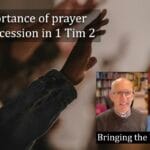The Sunday lectionary reading for Trinity 16 in Year C is Luke 17.5–10, and it offers some serious challenges to our understanding and practice.
(The epistle is 2 Tim 1.1–14, a passage full of fascinating ideas and startling metaphors; you can find the video discussion of that passage here, and video discussion of Luke 17 here. Both are also posted at the end of this article.)
The passage contains some basic textual challenges, in that the subject appears to switch suddenly from the question of ‘faith’ to being servants. The parable about servants itself has a sudden switch, in that Jesus begins the story by putting his listeners in the place of the master, but then concludes by putting them in the place of the servant.
But there are wider theological issues too. Only two chapters earlier, we have been told that those who are lost are loved and sought after, as a shepherd seeks a sheep, as a woman seeks out her lot coin, and as a father looks and longs for his lost son to return. How, then, are we merely ‘unworthy servants’. Are we not the ones whom Jesus ‘has loved to the end’, for whom Jesus wraps a towel around his waist and stops and is servant to us, as he washes our feet (John 13)? Are we not the precious ones who have been bought at a great price (1 Cor 6.20)?
And how might this read to those who have struggled with self-esteem, for whom God’s affirmation of their value has been the most powerful healing? Should we tell them that, in reality, they are ‘unworthy’? The same tension is found in the Common Worship liturgy for Communion, where the Prayer of Humble Access from the BCP (‘We are not worthy so much as to gather up the crumbs under your table…’) has been shoved in abruptly immediately before the distribution of the elements without the assurances that it originally came with. I never use it.
Part of the answer to this comes from noticing the context of the passage in Luke; once again, we need to recognise the shortcoming of dicing up the gospel text into lectionary portions, when it was written to be read continuously. (This might be a good reason for, alongside weekly preaching of these portions, finding time together to read the gospel through in one sitting; it would take less than two hours, and could be eased by the addition of breaks for coffee and biscuits!)
The journey motif, present since Luke 9.51, has dropped out of view for the last few chapters, and instead there has been a focus on who is in the kingdom. In fact, the journey motif will be revisited in the next verse where, in Luke 17.11, we have a reference to Jesus journeying ‘along the border between Galilee and Samaria’ which (if taken in order) means he hasn’t travelled very far in 9 chapters! (Failing to recognise the theological, rather than chronological, order of Luke’s material here can lead people into making daft claims about the identity of Martha and Mary…) So we need to read all this material as reflection on discipleship, and it turns out that the cluster of sayings grouped together here are directed ‘to his disciples’ in Luke 17.1 and then even more specifically to the ‘apostles’ (Luke 17.5), who haven’t been mentioned since returning from their ‘missionary journey’ in Luke 9.10.
So this teaching is directed to those already committed, those on the inside. And it is directed to them in the context of warnings not to be like the Pharisees ‘who loved money’ and status according to Luke (Luke 16.14). In this context, Jesus has just urged his close followers ‘Don’t become a stumbling block’ and ‘Don’t hold on to bitterness and resentment’ but forgive your brother or sister who sins against you and asks for forgiveness. The former was brought home to me sharply when I read the news that a local clergyman, someone whom I taught during his ordination training, has been convicted of defrauding a old woman and conning her into including him in her will before she died, after which he conducted her funeral.
The latter is illustrated by the stunning grace shown in a US court room as a man embraces the woman convicted of murdering his brother.
BREAKING: In stunning moment, Botham Jean's brother embraces Amber Guyger after her sentencing for his brother's murder.
"I don't even want you to go to jail. I want the best for you, because I know that's exactly what Botham would want." https://t.co/sWaPUtS0kj pic.twitter.com/xPAIKQLh6z
— ABC News (@ABC) October 2, 2019
No wonder that the Twelve plead with Jesus ‘Increase our faith!’ (or perhaps ‘Give us this kind of faith!’) If not, how can we live to these exacting standards?
The phrase here is πρόσθες ἡμῖν πίστιν, using the verb prostithemi, meaning to add to something that is already there. They have faith, but it is not this kind of faith, so there needs to be a dramatic change in the kind or degree of faith or trust that they have in God. The verb here is used in a mundane sense elsewhere in the gospel; Herod ‘adds’ to his offences by locking John the Baptist up in Luke 3.20, and Jesus points out that we cannot ‘add’ to our lives by worrying in Luke 12.25. But in Acts the verb is most often used in Luke’s periodic summary statements showing how the power of the Spirit at work amongst the believers leads to many being ‘added to their number’ (Acts 2.41, 2.47, 5.14, 11.24). Is there a connection between this kind of faith, and the growth of the people of God through people coming to faith themselves? Does faith beget faith?
Jesus’ surprising rebuke offers an insight into the issue linking these apparently disparate themes. It is not about you. When you focus on your own needs and agenda, that is when you become a stumbling block. When you focus on your rights and concerns, that is when it is hard to forgive. When you think that ‘faith’ is all about the strength of your inner convictions, that is when you get into trouble. The best analogy I have heard is that faith is like a tow rope used by one car to pull another car up a hill. If the second car won’t move, then it is no good attaching a stronger rope; what matters is the vehicle the rope is attached to! In a similar way, it is not the strength of our faith that is the issue; the question is, who is our faith placed in?
It is not clear exactly how common slavery was in first-century Israel. The Talmud does have regulations about the keeping of slaves, but there is a clear concern that Jewish practice should be seen as distinct from wider Roman practice, in part because of Jewish memory of being freed from slavery in the Exodus, and in part because of the humanising regulations in the Torah. In fact, there is a good case for not using the word ‘slave’ at all to translate OT language here; Peter Williams makes the case in this video that what is being described here is debt bondage, so we ought to read this as a discussion about servants, not slaves. (Josephus appears to believe that Jews were obliged to release all slaves after seven years, in line with the teaching in the Torah). Slaves are mentioned quite frequently in the NT, and slavery is assumed as a social phenomenon, but the lack of reference to the slaves of Jews in the gospels is striking. (The man going on a journey has slaves (douloi) in Matt 25.14, but the father of the prodigal has ‘hired hands’ (misthoi) in Luke 15.17.) This story would be much more powerful in the context of Luke’s readers, who it seems are largely gentiles outside of Israel—and it is striking that this is found in Luke alone.
The story envisions a master who has one servant, and that servant is both pastoral and domestic, working in the field as well as the home. Perhaps, though, we should not press the model here too far: Jesus’ points is that (as Luke’s readers know well) being a slave is hard and often thankless work, and the slave does not have rights or privileges.
The story disabuses the disciples of any claims to entitlement based on service (Mikeal Parsons, Paideia, p 253).
The analogy is not surprising, given that Luke frequently uses the slave/master relationship as a teaching point in his account of Jesus’ ministry. And, characteristically, Luke calls Jesus the apostles’ ‘Lord’ in introducing this section (Luke 17.5)
Luke’s audience might also, in the parable, have heard fairly loud echoes of the duties of leaders within the early Christian communities. Ploughing (in 1 Cor 9.10), tending the flock (in 1 Cor 9.7) and serving at the meal table (in 1 Cor 11; compare the debate in Acts 6) were all metaphors for aspects of Christian leadership (Parsons, p 254). This connects Luke’s theology with that of Paul, who consistently describes himself as ‘slave’ of Christ, and defines disciples as those who confess that ‘Jesus is Lord’ (Romans 10.9, 1 Cor 12.3).
But what kind of ‘Lord’ are we ‘slaves’ to? For Paul, he is the ‘Son of God who loved me and gave himself for me’ (Gal 2.20). He is the one who has ‘poured the love of God into our hearts by the Holy Spirit’ (Rom 5.5). He is the one who cried ‘Abba, Father’ to God, and having justified us freely (so that there is no condemnation), gives us his Spirit so that we too might cry out ‘Abba, Father’ as he did (Rom 8.15). He is the one who, on the cross, dealt with our sin and in his resurrection gave us new life, so that in baptism we died to sin and live to him (Rom 6.4). This is no ruthless master!
And it seems that for Paul, knowing the love and kindness of his master is precisely the thing which sets him free to submit to him as ‘slave’. So it must be for us.
Neither Christian discipleship nor Christian ministry are a means to privilege and power. They cannot be a means to prosperity—though can and should be a means of living, since ‘the worker is worthy of his or her hire’ (1 Tim 5.18 quoting as scripture Luke 10.7)—nor can they justify creating a culture of deference, in which leaders parade around in fine clothes and expect others to bow to them.
There is a radical egalitarianism assumed here, for if the service of Christ does not lead to exaltation, it follows that all in the community of faith are of the same status. Jesus makes this explicit in his criticism of the Pharisees in Matt 23.8–11:
But you are not to be called ‘Rabbi,’ for you have only one Master and you are all brothers. And do not call anyone on earth ‘father,’ for you have one Father, and he is in heaven. Nor are you to be called ‘teacher,’ for you have one Teacher, the Messiah. The greatest among you will be your servant.
If that happens, then we have succumbed to the temptations of the Pharisees, and we are in danger of exploiting our position by taking advantage of others. Worse than that, we have received our reward now and are in danger of forfeiting our reward from God (Matt 6.2, 6.5). And perhaps these things are a sign that we have forgotten the love and grace of God.
It turns out that the call to be humble servants offers just the liberation that we need.
Come and join Ian and James as they discuss the passage here, and the epistle 2 Tim 1.1–14 below.

 Buy me a Coffee
Buy me a Coffee




























Gird thyself, and serve me.—Better, minister to me.
When our performances are so lame and imperfect, that the greatest part of what we do amounts not to the least part of what we leave undone Matthew Poole’s Commentary
It was the practice of the church to Minister to the Lord,
we might do well to revive this order today.
Acts.13:1 Now there were in the church that was at Antioch certain prophets and teachers; as Barnabas, and Simeon that was called Niger, and Lucius of Cyrene, and Manaen, which had been brought up with Herod the tetrarch, and Saul.
13:2 As they ministered to the Lord, and fasted, the Holy Ghost said, Separate me Barnabas and Saul for the work whereunto I have called them.
And will not rather say unto him, Make ready wherewith I may sup, and gird thyself, and serve me, till I have eaten and drunken; and afterward thou shalt eat and drink?
Jesus, the servant of the Lord, drank the cup ordained for him by the Father. He satisfied God’s thirst for Justice. He drank the bitter dregs that we might enjoy the sweet Wine of the Kingdom.
— But while you endeavour to live in the exercise of this noble grace of faith, and in a series of such services as are the proper fruits of it, be careful, in the midst of all, to maintain the deepest humility, as in the presence of God your heavenly Master, on whom, as you are his servants, you can have no claim of merit:” Benson
“But though we are unprofitable to him, our serving him is not unprofitable to us. For he is pleased to give, by his grace, a value to our good works, which, in consequence of his promise, entitles us to an eternal reward”. Benson’s Commentary
Ian. I do agree with you on the concept of worthy. My take is this: Worthy is the Lamb. He has made us worthy by his sacrifice. We should not partake of Holy Communion ‘in an unworthy manner’.
I also enjoyed James’ singing of that lovely old chorus which took me back to my Christian Endeavour days as a teenager in Liverpool. We must sign him up again.
‘We are not worthy so much as to gather up the crumbs under your table’ is an important confession that we in our own selves are not worth a light. In prep for not taking Communion unworthily it is an important statement. I’ve always valued it. I know in my fallen state that I deserve death. But I prepare again to receive Christ in his body and blood… and IN him I’m a daughter of the King. The full liturgical journey, to my mind, though is vital. And for all its so very many faults, the c of e does that journey beautifully.